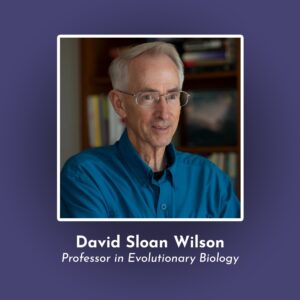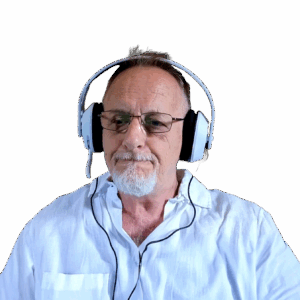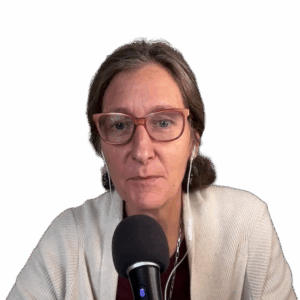
Ep 56 | David Sloan Wilson
David Sloan Wilson: “Chickens, Cooperation and a Pro-social World”
Show Summary
On this episode, evolutionary biologist David Sloan Wilson joins Nate to unpack how evolution can be used to explain and understand modern human behavior, particularly with respect to cooperation and pro-social behavior. David is a leading scholar in this field, especially on the resurgence of the concept ‘multi-level selection’. How can an evolutionary idea, first thought of by Darwin and subsequently ignored until recently, shed light on human’s inherent balance between competition and cooperation? And how might our improved knowledge of where we come from inform our behaviors and collective governance in the decades ahead?
About David Sloan Wilson
David Sloan Wilson is one of the foremost evolutionary thinkers and gifted communicators about evolution to the general public. He is SUNY Distinguished Professor of Biology and Anthropology Emeritus at Binghamton University and President of the nonprofit organization ProSocial World, whose mission is “To consciously evolve a world that works for all”. His most recent books are This View of Life: Completing the Darwinian Revolution, Prosocial: Using Evolutionary Science to Build Productive, Equitable, and Collaborative Groups (with Paul Atkins and Steven C. Hayes), and his first novel, Atlas Hugged: The Autobiography of John Galt III.
In French, we have a motto that says that a simple drawing is often better than a long explanation. Jean-Marc Jancovici Carbone 4 President
That’s very understandable because with left atmosphere thinking, one of the problems is that you see everything as a series of problems that must have solutions. Iain McGilchrist Neuroscientist and Philosopher
We can’t have hundreds and hundreds of real relationships that are healthy because that requires time and effort and full attention and awareness of being in real relationship and conversation with the other human. Nate Hagens Director of ISEOF
This is the crux of the whole problem. Individual parts of nature are more valuable than the biocomplexity of nature. Thomas Crowther Founder Restor
Show Notes & Links to Learn More
Download transcript00:40 – David Sloan Wilson works and info
02:35 – Charles Goodnite
02:48 – Multi-level selection
03:12 – Evolution for Everyone
03:19 – Evolution Institute
04:58 – Sloan Wilson
05:41 – Theodosius Dobzhansky
06:29 – Optimal Foraging Theory
06:48 – E.O. Wilson
06:55 – E.O. Wilson and David Sloan Wilson’s paper: Rethinking the Theoretical Foundation of Sociobiology | The Quarterly Review of Biology: Vol 82, No 4
07:17 – Group Selection
08:12 – Reductionism
08:24 – Émile Durkheim
09:30 – Lamarckism
10:03 – Darwin on Group-Selection
10:58 – The 6 Legacies of E.O. Wilson
11:18 – Kin Selection, WD Hamilton
11:58 – Complex Systems Thinking
17:53 – Chimpanzee males obsession with status
18:30 – Stoning as a social adaptation
18:55 – Humans have been a species for 300,000 years
19:40 – Small groups are central to human behavior
20:03 – The Dawn of Everything
21:12 – Why Nations Fail by Daron Acemoglu, James A. Robinson
22:32 – Elinor Ostrom
24:15 – The Capacity for Abstract thought is distinctive/unique characteristic of human thought
25:20 – Nature vs Nurture
25:44 – Blank Slate
26:10 – Evolutionary psychology
26:17 – Leda Cosmides, John Tooby, Steven Pinker
26:58 – BF Skinner, Margaret Mead, Clifford Geertz
27:29 – Innate Component and Adapt Component of the Immune System
28:20 – Joe Henrich – Secret of Our Success & Weirdest People in the World
30:33 – Flour Beetles
33:20 – Microbiome
34:34 – Michael Wade
35:02 – William Muir Purdue University
37:55 – Rank and yank
38:31 – The Problem with Super Chickens National Geographic
40:15 – Elinor Ostrom’s Core Design Principles
40:53 – Tragedy of the Commons
45:40 – Business groups were deficient in all Principles
47:25 – B Corp, Conscious Capitalism
47:30 – Raj Sisodia, Firms of Endearment
47:40 – Everyone Matters, Bob Chapman
48:32 – Elon Musk Twitter Firings
53:03 – Tight Society vs Loose Society
53:20 – Michele Gelfand
56:26 – Making Democracy Work
1:02:18 – Factors affecting behavior change
1:02:42 – Nate’s superorganism paper
1:04:49 – Satya Nadella
1:05:08 – Bill Gates, Steve Ballmer
1:06:30 – Hit Refresh
1:08:37 – Overton Windows
1:10:40 – “It’s easier to imagine the end of the world than it is to imagine the end of capitalism” – (often attributed to Mark Fisher, Slavoj Zizek or Fredric Jameson)
1:12:52 – Baháʼí Faith
1:15:15 – Generalized Darwinism
1:20:25 – Davidsloanwilson.world, Prosocial.world, and thisviewoflife.com






